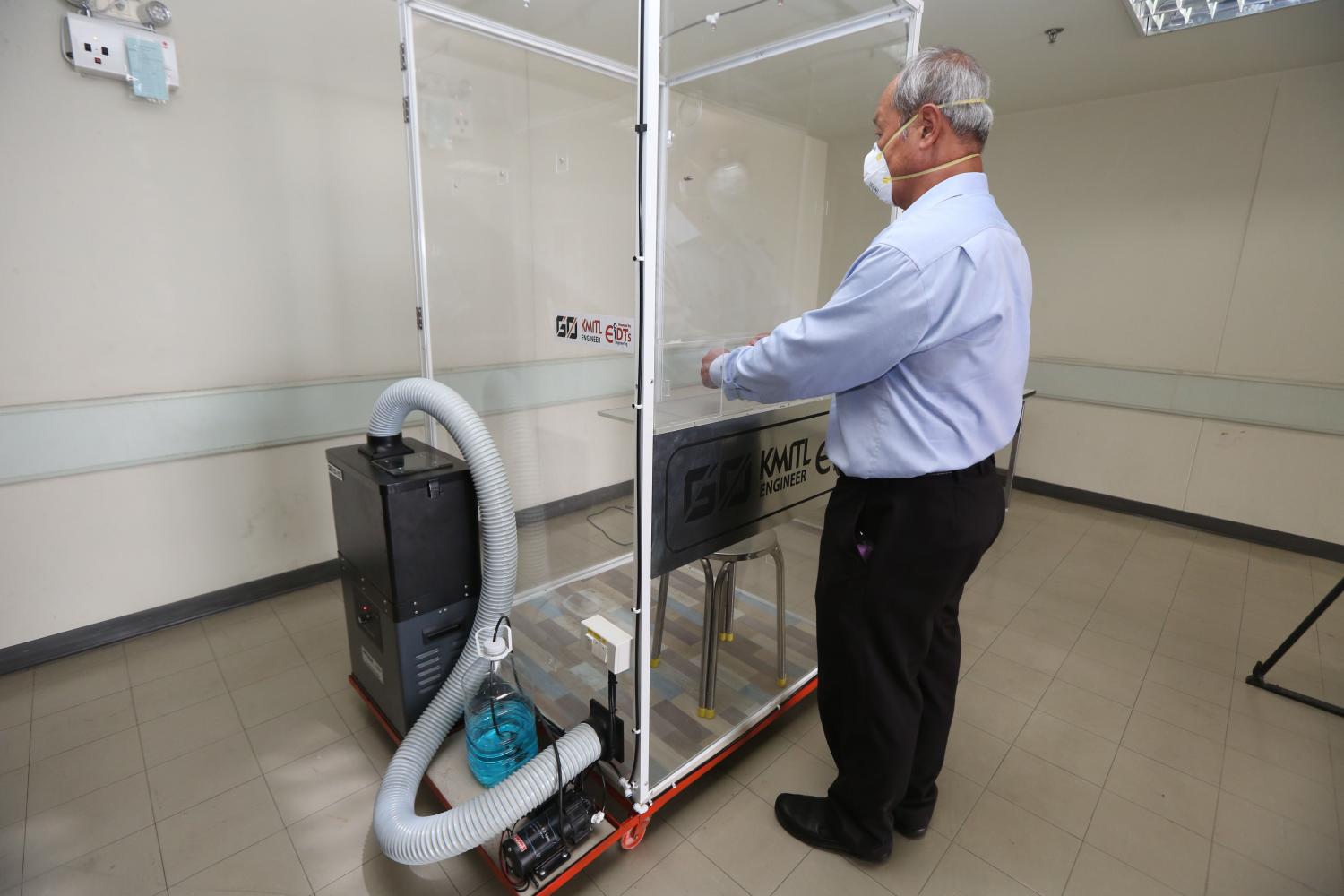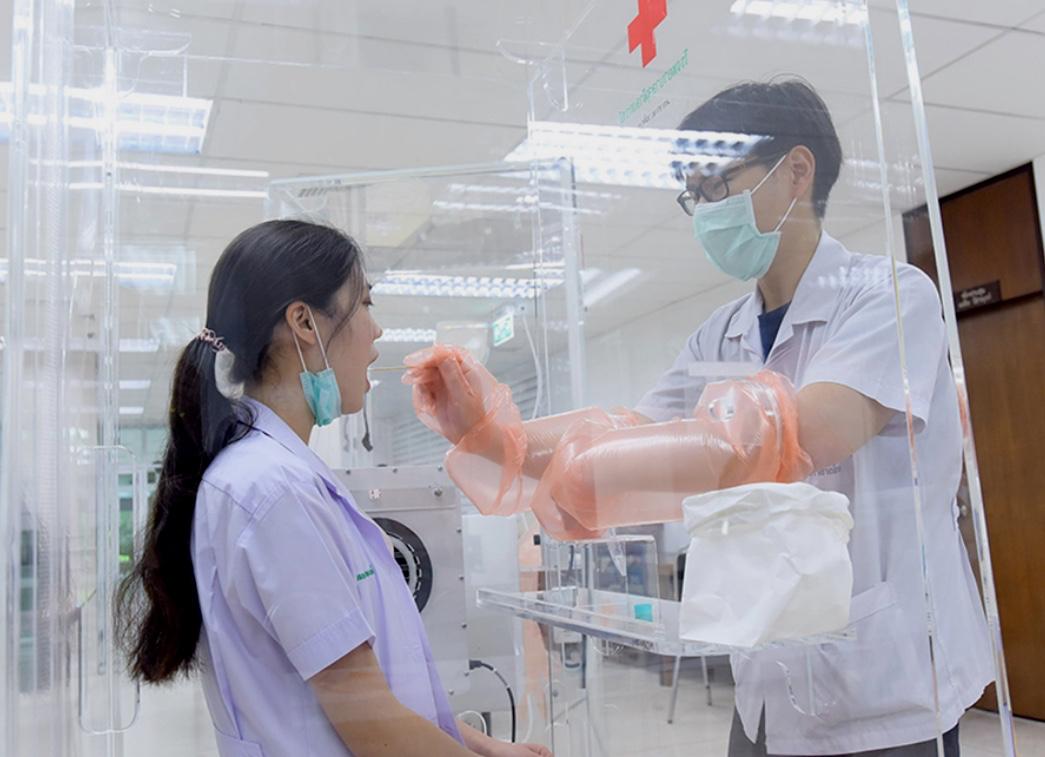Brighter smiles can now be seen on the faces of all Thais as daily new Covid-19 cases come down to single digits.
But before Thailand reached this point, the country witnessed efforts by universities nationwide during the past challenging months to innovate products and tools to help medical professionals fight against the unprecedented outbreak that has so far infected almost 3,000 Thais.
To salute all those contributions and the commitment to making Thailand a healthier, safer place, we put together innovative projects by Thailand's leading think-tank universities which help safeguard the country and its population from the deadly virus.
RAPID TEST KITS
Being able to identify patients quickly is a must to slow down the spread of the virus. Three rapid test kits have been separately developed by Chulalongkorn University in Bangkok, Prince of Songkla University in the Southern Songkhla province and Vidyasirimedhi Institute of Science and Technology (Vistec) in Rayong.

A telemedicine robot, Ninja, developed by a Chulalongkorn University. Somchai Poomlard
The "Chula Covid-19 Strip Test" was created by the Faculty of Pharmacy at Chulalongkorn University. It is a finger-prick blood test and based on a serology method. The kit can detect antibodies in the blood serum or plasma within 15 minutes.
The same technique was also developed by researchers at the Medical Technology Faculty, the Faculty of Medicine and the Pharmaceutical Sciences Faculty of Prince of Songkla University. Titled "PSU Covid-19 Rapid Test" scheduled to be launched next week, the project receives financial support from private companies including Somapa Information Technology and Lao Airlines, the national airline of Laos.

A telemedicine robot called Ninja, left, and food delivery bot Pinto, developed by a Chulalongkorn University. Pattarapong Chatpattarasill
The rapid test kit by Vistec, on the other hand, differs from the other two projects. The Vistec test is based on an antigen method. The test kit can detect antigens from a nasal swab. The technique can identify if someone is infected with the virus before the symptoms of the disease are present, which normally occurs within 14 days. The rapid test kit can give a result within an hour.
The Vistec test is a joint research project by the Biomolecular Science and Engineering Faculty of Vistec, the Faculty of Medicine at Siriraj Hospital and Mahidol University's Faculty of Science, with special support from Prapokklao Chanthaburi Hospital, the Department of Medical Sciences of the Public Health Ministry, the Broad Institute in Massachusetts, the Massachusetts Institute of Technology and Harvard University and private companies including Siam Commercial Bank and PTT Plc which is the founder of Vistec.
The three rapid test kits will not replace the standard RT-PCR Covid-19 test in a laboratory. The test kits will be used as preliminary tools to screen for suspected Covid-19 patients, according to the Department of Medical Sciences.
HELPING HAND ROBOTS
Chulalongkorn University's Engineering Faculty introduced a series of robots to ease the work of medical professionals. Developed under the CU-Robot Covid project, the first was Ninja. Modified from a machine for monitoring stroke patients, Ninja allows doctors to communicate with Covid-19 patients remotely. The machine can also send a patient's blood pressure, pulse and temperature to the doctor on duty.

Sofa by KMUTT is a nurse-like robot featuring temperature checks and supports telemedicine. King Mongkut's University of Technology Thonburi
The Ninja robot is used at Bamrasnaradura Infectious Diseases Institute and Rajavithi Hospital.
The second robot is called Pinto. The research team modified a common food cart to be controlled to deliver food and medicines for the patients. The prototype is working at Ramathibodi Hospital, King Chulalongkorn Memorial Hospital and Vachira Phuket Hospital.
The Institute of Field Robotics (Fibo) at King Mongkut's University of Technology Thonburi (KMUTT) has also launched a series of robots under the Faco project. The name is short from Fibo Against Covid.
First in the series is Carver. The food cabinet on small wheels can be controlled remotely to deliver up to 20 trays of food to Covid-19 patients who may have mild symptoms. Equipped with a hydroxyl generator, the robot can purify the air while working.
Next is Sofa, a nurse-like machine. It is equipped with a monitor for doctors to remotely communicate with patients. The blue-and-white robot has a high-definition video camera for a doctor to roughly check a patient's condition. The robot also has a thermal camera to scan the temperature of the patient.

Created by KMITL's research team, a mobile acrylic booth is designed for swab tests. Varuth Hirunyatheb
The third machine is a Service robot. It can deliver medicine, food and water to individual patients who need special care. The robot has a monitor for the patients to communicate with doctors or nurses when they need help.
KMUTT will distribute the robots to hospitals such as Ramathibodi Chakri Naruebodindra Hospital and Queen Sirikit National Institute of Child Health.
Thammasat University's Engineering Faculty also designed the Tham-Robot.
The machine is designed as a trolley with remote control and a screen for delivering medicines and food to patients in the field hospital at Thammasat University Hospital.
The research team plans to produce more Tham-Robots for other hospitals if requested.
PROTECTIVE GEAR
Suranaree University of Technology (SUT) in Nakhon Ratchasima launched a face shield project to encourage those who have 3D printers to help supply personal protective equipment (PPE) for medical professionals.

A mini emergency ventilator developed by King Mongkut's Institute of Technology Ladkrabang. VARUTH HIRUNYATHEB
The project is created by The Maker@SUT, a working group from the Medicine, Social Technology and Engineering institutes. It has created more than 300 face shields and distributed them to hospitals nationwide as well as the army and medical professionals in the Deep South. Those who have 3D printers can download the face shield files at prusaprinters.org/prints/25857-prusa-face-shield.
Many universities create nano masks for those who work in hospitals.
The techniques include applying either a nano filter or coating face masks with nanotechnology to make them fluid-resistant and increase the filtration capability. The nano masks are washable and reusable up to 20 times.
Universities that produce nano masks include Chiang Mai University's Science Faculty, Maejo University's Science Faculty also in Chiang Mai, King Mongkut's University of Technology North Bangkok's Science and Technology Research Institute, Mahidol University's Medicine Faculty, Rajamangala University of Technology Srivijaya's Engineering Faculty in Songkhla and Thaksin University's Engineering Faculty also in Songkhla.
The Engineering Faculty of King Mongkut's Institute of Technology Ladkrabang also launched the "KMITL Go Fight Covid-19" project. The research team created a swab test acrylic booth. The booth allows a doctor to collect samples from a patient's nose and mouth without getting too close.

A doctor demonstrates how to take a sample swab while using the negative pressure booth created by Chulalongkorn University. Chulalongkorn Hospital
Each booth also has a self-sanitising function by using UV-C bulbs. Another practical tool is a mini emergency ventilator. The team has produced about 20 so far for hospitals. The last technology is a negative pressure room to keep airborne microorganisms from escaping. All the products are now in use at Sirindhorn Hospital in Bangkok.
The Faculty of Medicine of Chulalongkorn University applied the negative pressure technique and produced a mobile acrylic booth for doctors to swab samples from a patient's nose with minimum risk. The mobile booth is equipped with a high-efficiency particulate air filter and UV-C bulbs for sterilisation.
Booths are being used at King Chulalongkorn Memorial Hospital while 50 others are to be sent to hospitals in other provinces such as in Chon Buri, Yala and Pattani.
DISINFECTANT DEVICES
Sanitiser Tunnels were created by a research team at Khon Kaen University. The prototype tunnel features eight sprayers. Equipped with sensors, the tunnel will automatically spray sanitising fluid when a person walks through.

A face shield produced by a 3D printer. Suranaree University of Technology
In addition, the university introduced sterilisation boxes to disinfect PPE and medical tools for hospitals. The box sprays sanitiser, then disinfects the tools with ozone, a colourless gas, and finally uses UV-C light.
A research team at the Engineering Faculty of Prince of Songkla University created a disinfection box with two UV-C bulbs to kill germs on banknotes, face masks or even books within 15 minutes. The team produced 30 boxes for medical services in the Deep South.

